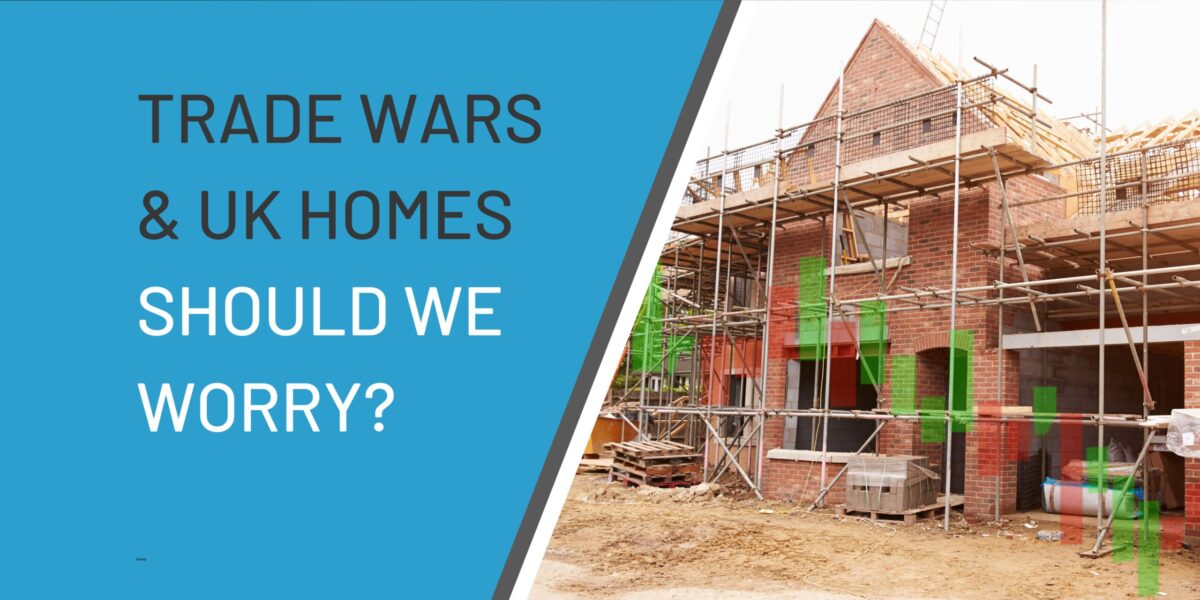It’s been a dramatic week in global economics. President Trump, now a few months into his second term, has reignited trade tensions with China, imposing sweeping new tariffs (at the time of writing) of 145% on selected Chinese goods imported to the US. In response, China has raised its own tariffs on American imports to 125%, further escalating a trade standoff that’s sending shockwaves through global markets.
For most of us working in or around the UK property sector, events like these can feel distant- concerning, yes, but not directly relevant to the everyday workings of buying and selling homes. After all, housing isn’t traded on global stock exchanges. Bricks and mortar don’t respond to a tweet or a tariff overnight.
But over the years, one thing has become clear: the property market may be insulated from short-term drama, but it is never entirely immune to global conditions. What happens in Washington, Beijing, or Wall Street can and often does shape the mood, the cost of doing business, and the confidence that underpins the entire housing sector.
This latest escalation in the US-China trade war has already caused a wobble in global stock markets. Investors don’t like surprises, and tariffs of this scale, particularly when imposed quickly. Introduce a level of uncertainty that can affect everything from inflation expectations to long-term economic planning. That has knock-on effects, even here.
In the UK, we’ve spent the past two years navigating the uncomfortable pairing of high inflation and high interest rates. Hopes have been building that, with inflation softening, we might soon see a cut in borrowing costs – good news for homebuyers and sellers alike. But trade wars tend to do the opposite. When goods become more expensive to move or make, those costs are often passed on. Inflation can resurface. And that could make rate cuts less likely in the near term.
In the UK, we’ve spent the past two years navigating the uncomfortable pairing of high inflation and high interest rates. Hopes have been building that, with inflation softening, we might soon see a cut in borrowing costs – good news for homebuyers and sellers alike. But trade wars tend to do the opposite. When goods become more expensive to move or make, those costs are often passed on. Inflation can resurface. And that could make rate cuts less likely in the near term.
For property buyers relying on mortgages, that matters. For developers financing large-scale projects, it matters. And for landlords, especially those with multiple properties and variable rates, it matters too.

There’s also the issue of materials. While UK housebuilders don’t rely directly on US-China trade routes, the global marketplace is interconnected. If tariffs push up the cost of raw materials – metals, electronics, certain manufacturing inputs- that pricing pressure can ripple across the supply chain. Smaller developers, already feeling the pinch from labour costs and cautious lending, may face further pressure. And that could slow down new builds, refurbishment projects, and even some commercial-to-residential conversions that are just about viable under current conditions.
But perhaps more than anything else, it’s confidence that takes the hit. Property decisions are often delayed, not by a lack of means or motivation, but by a sense that now might not be the right time. In uncertain moments — like during political upheaval, pandemic recovery, or global economic shocks — we tend to see caution take hold. Buyers pause to see what will happen with rates. Sellers hesitate, unsure if now is the right moment to act. Investors, both domestic and international, begin to weigh up risk in a different light.
And this may be one of those moments. Not a crisis, not a collapse — but a brief cooling, prompted less by local fundamentals than by global unrest.
What should people do? The same as always: make decisions based on individual needs and long-term plans. If you need to move, and the finances work, don’t let international headlines deter you. If you’re unsure, speak to a professional who can offer grounded, market-specific advice. Because while the global picture may be noisy, most property decisions are made locally — and for reasons much closer to home.
There is no need for alarm, but it’s worth staying informed. Trade tensions may not directly shape the housing market, but they can influence the conditions around it — inflation, interest rates, building costs, and above all, sentiment. And in this business, that’s often what moves the market.

